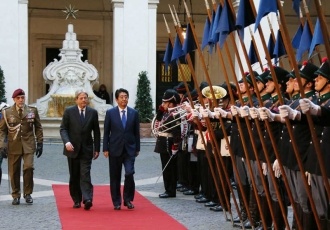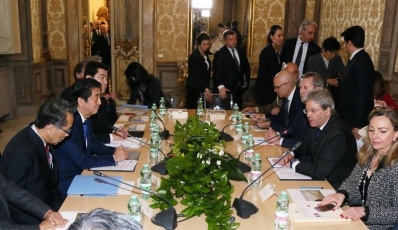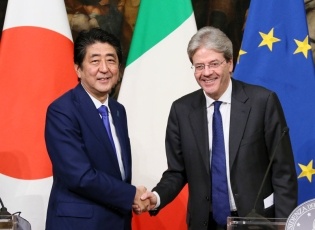Japan-Italy Relations
Japan-Italy Summit Meeting
March 21, 2017
 (Photo: Cabinet Public Relations Office)
(Photo: Cabinet Public Relations Office)
 (Photo: Cabinet Public Relations Office)
(Photo: Cabinet Public Relations Office)
 (Photo: Cabinet Public Relations Office)
(Photo: Cabinet Public Relations Office)
On Tuesday, March 21, commencing at 6:00 p.m. for approximately 60 minutes, Mr. Shinzo Abe, Prime Minister of Japan, who is visiting Italy, held a Japan-Italy Summit Meeting with H.E. Mr. Paolo Gentiloni, President of the Council of Ministers of Italy, at Palazzo Chigi (the Italian Prime Minister’s Office). The overview of the meeting is as follows.
- 1. Beginning
- 2. Cooperation for the G7 Taormina Summit
- 3. Japan-European Union (EU) relations
- 4. Regional affairs
- 5. Bilateral relations
1. Beginning
(1) Prime Minister Abe stated that he was looking forward to working with President Gentiloni, who strove to strengthen the Japan-Italy relations as Minister for Foreign Affairs as well. Prime Minister Abe also stated that Japan and Italy shared universal values and were important partners that together address the various challenges facing the international community. He explained that as the previous G7 Chair, he intended to fully support Prime Minister Gentiloni, the current Chair, for the success of the Taormina Summit.
(2) In response, Prime Minister Gentiloni stated that he would like to further develop the relationship based on a cultural, political and historical backdrop, on the occasion of the 150th anniversary of the establishment of diplomatic relations between Japan and Italy, which both countries celebrated last year.
(2) In response, Prime Minister Gentiloni stated that he would like to further develop the relationship based on a cultural, political and historical backdrop, on the occasion of the 150th anniversary of the establishment of diplomatic relations between Japan and Italy, which both countries celebrated last year.
2. Cooperation for the G7 Taormina Summit
(1) As Italy serves as the G7 Chair this year, following Japan which was last year’s Chair, the two leaders confirmed close cooperation between the current and former Chairs for the success of the G7 Taormina Summit. Particularly, amidst concerns about the rise of protectionism and inward-looking sentiment in the world, the two leaders shared the view that the G7 should show the world that the G7’s value, unity and responsibility would be unshakeable.
(2) Specifically, the two leaders reconfirmed the need to solidify the global economy’s return to a growth track, and to deal with downside risks and discontent over disparity, and that the G7 should utilize all policy tools including fiscal stimulus in leading the global economy. In addition, the two leaders shared the view that the principle agendas of the G7 Ise-Shima Summit, including health and women’s active participation would be advanced further.
(3) In the area of politics and diplomacy, the two leaders confirmed the importance of the G7 continuing to deepen its discussion on such themes as the East Asia situation and maritime security.
(4) Prime Minister Gentiloni stated that he would like to raise the issue of food security in Africa.
(2) Specifically, the two leaders reconfirmed the need to solidify the global economy’s return to a growth track, and to deal with downside risks and discontent over disparity, and that the G7 should utilize all policy tools including fiscal stimulus in leading the global economy. In addition, the two leaders shared the view that the principle agendas of the G7 Ise-Shima Summit, including health and women’s active participation would be advanced further.
(3) In the area of politics and diplomacy, the two leaders confirmed the importance of the G7 continuing to deepen its discussion on such themes as the East Asia situation and maritime security.
(4) Prime Minister Gentiloni stated that he would like to raise the issue of food security in Africa.
3. Japan-European Union (EU) relations
The two leaders shared the view that they would collaborate closely to realize an agreement in principle on the Japan-EU Economic Partnership Agreement (EPA) as early as possible.
4. Regional affairs
(1) With regard to the situation in the East China Sea and South China Sea, the two leaders shared the view that they would continue to collaborate closely to maintain the international order based on the rule of law.
(2) Based on the recent ballistic missile launches by North Korea, the two leaders shared the view that Japan and Italy would coordinate to ensure the effectiveness of United Nations Security Council (UNSC) resolutions. In addition, Prime Minister Abe explained that Japan and the EU have jointly submitted a resolution to the UN Human Rights Council regarding the abduction issue by North Korea, and explained that he would like to continue to obtain understanding and support from Italy as well. Prime Minister Abe secured Prime Minister Gentiloni’s understanding and support for efforts to resolve this issue.
(3) The two leaders exchanged views on the Russia-Ukraine situation, and confirmed that they would collaborate closely while attaching importance to the unity of the G7.
(2) Based on the recent ballistic missile launches by North Korea, the two leaders shared the view that Japan and Italy would coordinate to ensure the effectiveness of United Nations Security Council (UNSC) resolutions. In addition, Prime Minister Abe explained that Japan and the EU have jointly submitted a resolution to the UN Human Rights Council regarding the abduction issue by North Korea, and explained that he would like to continue to obtain understanding and support from Italy as well. Prime Minister Abe secured Prime Minister Gentiloni’s understanding and support for efforts to resolve this issue.
(3) The two leaders exchanged views on the Russia-Ukraine situation, and confirmed that they would collaborate closely while attaching importance to the unity of the G7.
5. Bilateral relations
(1) The two leaders confirmed that they would deepen cooperation on counterterrorism.
(2) The two leaders confirmed that both countries would start negotiations on an agreement on the transfer of defense equipment and technology.
(3) Furthermore, Prime Minister Abe expressed expectation that restrictions on imports of food products from Japan, including those from Fukushima, would be lifted. Prime Minister Gentiloni replied that he would fulfill a promise to abolish restrictions on safe food products.
(2) The two leaders confirmed that both countries would start negotiations on an agreement on the transfer of defense equipment and technology.
(3) Furthermore, Prime Minister Abe expressed expectation that restrictions on imports of food products from Japan, including those from Fukushima, would be lifted. Prime Minister Gentiloni replied that he would fulfill a promise to abolish restrictions on safe food products.

